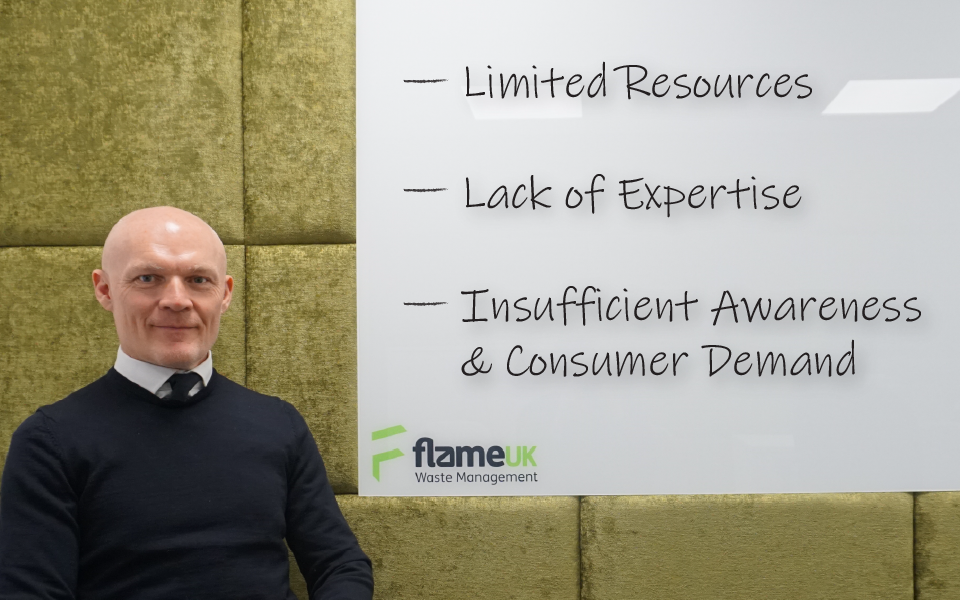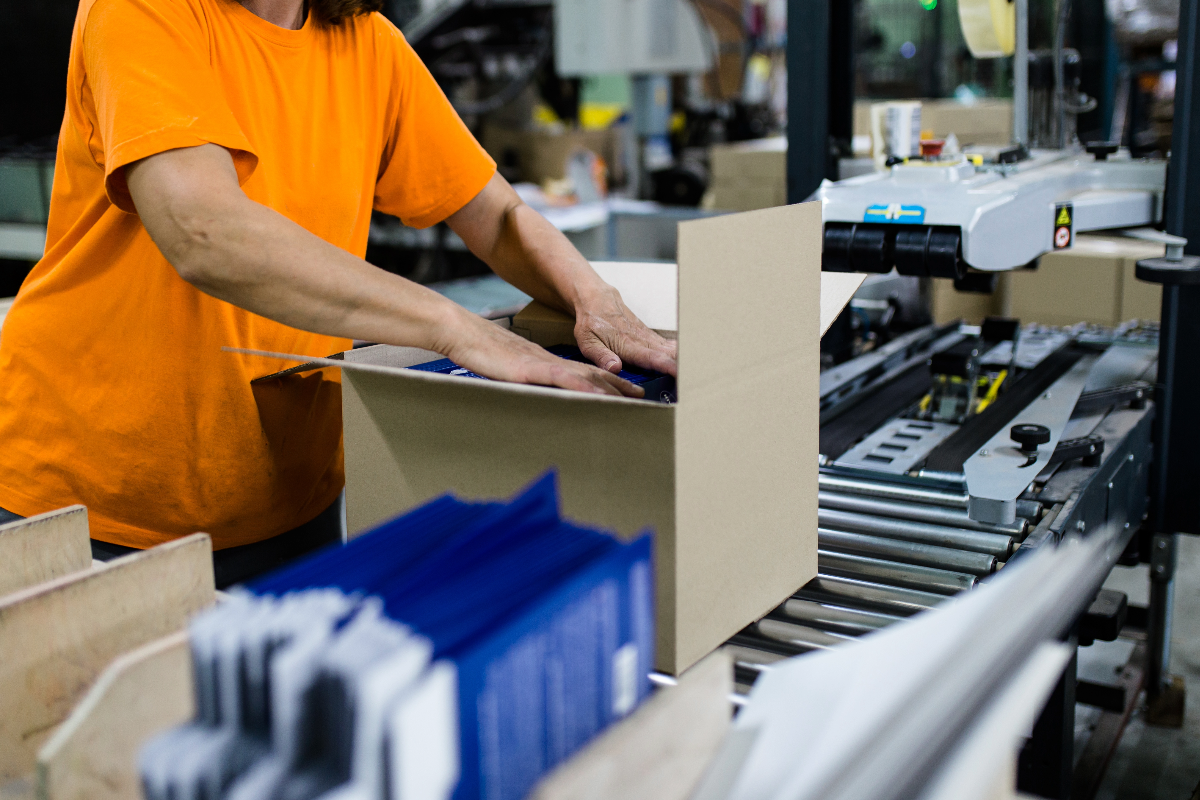Overcoming Sustainability Challenges for SMEs: Expert Insights from Dan Pegram of Flame UK
Check out our LinkedIn for live updates

George Gash
Published: 10/10/2023
Sustainability has become more than just a buzzword in the business world—it’s a fundamental concept shaping the way companies operate and adapt to the changing environment.
Small and Medium-sized Enterprises (SMEs) are a crucial part of this transition, but they face unique challenges when it comes to embracing sustainability. Last week George Gash sat down with Dan Pegram, the Director of Flame UK, to discuss the evolving landscape of sustainability in the business world and the challenges that SMEs can expect to face.

Q:// How sustainability has evolved from a mere buzzword into a cornerstone of modern business?
Dan: Sustainability has indeed come a long way from being a buzzword. In the past, it might have been considered an afterthought or a “nice-to-have” for businesses. However, it’s now a cornerstone because of the undeniable urgency of environmental and social issues that our world faces. Customers, investors, and even governments are increasingly demanding that businesses act responsibly, and this has reshaped the business landscape.
Businesses now understand that sustainability is more than just being ‘green’ and not only about protecting the environment but also about ensuring long-term viability. Companies that ignore these sustainability imperatives risk losing competitiveness and opportunities in the long run. This evolution has made sustainability an integral part of business strategies rather than a mere marketing gimmick.
Q:// Sustainability is no longer just an option—it’s a necessity. What specific challenges do you believe SMEs face when they embark on their journey towards sustainability?
Dan: SMEs certainly face some unique challenges on the path to sustainability. The three major challenges I see are limited resources, a lack of expertise, and insufficient awareness and consumer demand.
- Limited Resources: SMEs often operate with tighter budgets and smaller teams compared to larger corporations. This can make it difficult for them to invest in sustainable technologies, hire specialised personnel, or allocate sufficient time and funds for sustainability initiatives.
- Lack of Expertise: Sustainability is a complex field with a wide range of regulations and technologies. SMEs often lack in-house experts to guide them on their sustainability journey.
- Insufficient Awareness and Consumer Demand: Many SMEs may not fully understand the significance of sustainability in the current market. Additionally, they may struggle to communicate their sustainability efforts to consumers who are increasingly seeking eco-friendly and socially responsible products and services.
What role does waste play on the journey to Net Zero? Click here to find out!
Q:// Let’s delve into potential solutions for SMEs to overcome these hurdles. Limited resources: What strategies would you suggest for SMEs to address this challenge effectively?
Dan: To tackle limited resources, SMEs should first and foremost prioritise sustainability within their business strategy. It’s not just a “nice-to-have” but a fundamental aspect of ensuring long-term success. Starting small is also crucial. SMEs can begin with incremental steps like energy conservation, waste reduction, or switching to eco-friendly suppliers. Exploring government incentives and grants can provide financial support for these initiatives. Moreover, collaborating with other businesses and involving employees in sustainability efforts can be extremely beneficial in making the most of limited resources.
Q:// Lack of Expertise: How can SMEs bridge the gap in expertise when it comes to sustainability?
Dan: SMEs can address the expertise challenge by investing in education and training related to sustainability. There are plenty of online courses and resources available, Flame UK are part of the East Midlands Chamber and through this we have the opportunity to attend many interesting workshops, training sessions and webinars.
Additionally, they can consult with sustainability experts on a project-by-project basis to access specialized knowledge without a long-term financial commitment. Technology can also be a valuable tool for SMEs. Sustainability software and tools can help them measure their environmental impact, track their progress, and identify areas for improvement. This is something that is available to our customers. We’re also working on something very exciting that we believe will impact the value we can add to our customers. Lastly, forming partnerships with local universities or research institutions can provide access to academic expertise.
Has your business considered an ISO 14001 certification? Click here to learn more!
Q:// Insufficient Awareness and Consumer Demand: In today’s market, building awareness and meeting consumer demand for sustainability is essential. How should SMEs go about this?
Dan: SMEs should begin by conducting market research to understand the sustainability landscape in their industry. This involves studying competitors to identify gaps and opportunities. Transparency is key. Consumers are increasingly interested in the environmental and social impact of products and services. SMEs should communicate their sustainability efforts transparently to build trust and attract conscious consumers.
Educating their team about the importance of sustainability and engaging with stakeholders, including suppliers and customers, can be instrumental. Depending on the industry, obtaining relevant sustainability certifications or labels can also serve as third-party validations of their commitment to sustainability. Finally, crafting a compelling sustainability narrative and telling their story can engage consumers on a deeper level.
Q:// Why is it so important to customers?
Dan: Much research increasingly shows that consumers are making more conscious decisions with sustainability and the environment in mind. Businesses need to think not only about their product or service but also about the impact of the supply chain and service delivery.
Q:// It’s a challenging landscape to publicise business operations as ‘green.’ We’ve heard of many businesses being accused of ‘greenwashing.’ Now, many businesses, although they present excellent efforts towards sustainability, have been ‘green-hushed.’ What are your thoughts?
Dan: It definitely seems like you’re walking on thin ice sometimes. A couple of years ago, Shell posted a poll on Twitter, asking their audience, “What are you willing to change to help reduce emissions?” This quickly went viral as fingers were pointed at Shell and their contributions to climate change.
This depends on each business and their unique circumstances, of course. However, I believe that we shouldn’t place sustainability pressures on our customers before we explore preventive methods to reduce our own (as businesses) impact in the first place.
For example, I recently attended a webinar on ‘Green-winning,’ where we discussed sustainability efforts in the healthcare sector. Operations have a significant impact on the environment. It was suggested that healthcare practitioners should inform their patients about the environmental impact of their operations. Choosing between a life and the environment – I don’t feel comfortable with that choice. However, another suggestion made was to focus on preventive measures that would reduce the need for operations altogether. Prevention, rather than reaction, seems like a much better approach.
Contact Us
Want to become more sustainable in your business operations but not sure where to start? Flame UK can help your business to get on the right tracks to reduce your business’ emissions and costs. Get in touch with our team today to learn more about how Flame UK can support your business.




